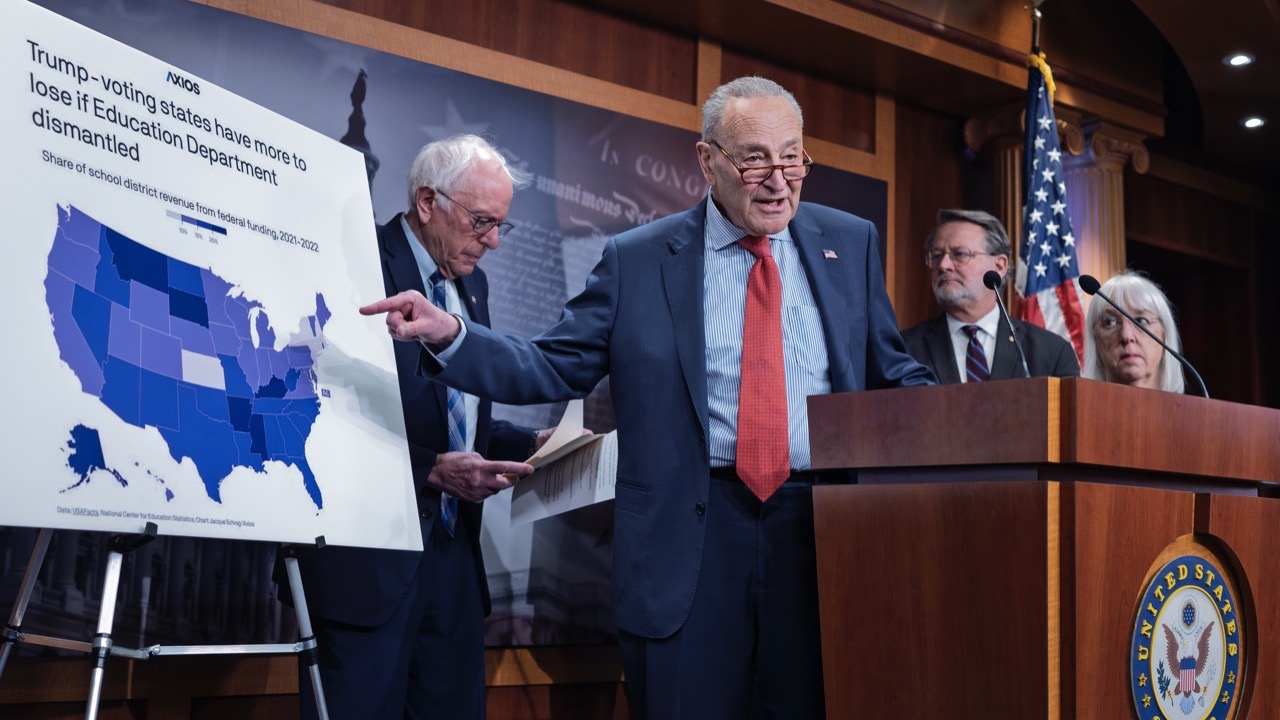President Trump's plans to dismantle the Education Department could reshape federal oversight of schools and student loans. (AP/J. Scott Applewhite)

- Trump's administration has cut Education Department staffing by half and is considering closing the agency entirely.
- The department manages $1.5 trillion in student loan debt and oversees civil rights enforcement in schools.
- Trump plans to shift federal education functions to states and change how civil rights laws are applied in schools.
Share
WASHINGTON — President Donald Trump has said he wants his new education chief, Linda McMahon, to “put herself out of a job.”
Since Trump took office, staffing at the Education Department has been cut in half, and he has been mulling an executive order to close the agency.
Eliminating the department altogether would be a cumbersome task, which likely would require an act of Congress.
Already, the Trump administration has started overhauling much of the department’s work. Trump adviser Elon Musk’s Department of Government Efficiency has cut dozens of contracts it dismissed as “woke” and wasteful. It gutted the Institute of Education Sciences, which gathers data on the nation’s academic progress.
The agency’s main role is financial. Annually, it distributes billions in federal money to colleges and schools and manages the federal student loan portfolio. Closing the department would mean redistributing each of those duties to another agency. The Education Department also plays an important regulatory role in services for students, ranging from those with disabilities to low-income and homeless kids.
Indeed, federal education money is central to Trump’s plans for colleges and schools. Trump has vowed to cut off federal money for schools and colleges that push “critical race theory, transgender insanity, and other inappropriate racial, sexual or political content” and to reward states and schools that end teacher tenure and support universal school choice programs.
Federal funding makes up a relatively small portion of public school budgets — roughly 14%. Colleges and universities are more reliant on it, through research grants along with federal financial aid that helps students pay their tuition.
Here is a look at some of the department’s key functions, and how Trump has said he might approach them.
Student Loans and Financial Aid
The Education Department manages approximately $1.5 trillion in student loan debt for over 40 million borrowers. It also oversees the Pell Grant, which provides aid to students below a certain income threshold, and administers the Free Application for Federal Student Aid (FAFSA), which universities use to allocate financial aid.
President Joe Biden’s administration made cancellation of student loans a signature effort of the department’s work. Even though Biden’s initial attempt to cancel student loans was overturned by the Supreme Court, the administration forgave over $175 billion for more than 4.8 million borrowers through a range of changes to programs it administers, such as Public Service Loan Forgiveness.
The loan forgiveness efforts have faced Republican pushback, including litigation from several GOP-led states.
Trump has criticized Biden’s efforts to cancel debt as illegal and unfair, calling it a “total catastrophe” that “taunted young people.” Trump’s plan for student debt is uncertain: He has not put out detailed plans.
Related Story: Trump Is Said to Be Preparing Order That Aims to Eliminate Education Department
Civil Rights Enforcement
Through its Office for Civil Rights, the Education Department conducts investigations and issues guidance on how civil rights laws should be applied, such as for LGBTQ+ students and students of color. The office also oversees a large data collection project that tracks disparities in resources, course access and discipline for students of different racial and socioeconomic groups.
Trump has suggested a different interpretation of the office’s civil rights role. Under his administration, the department has instructed the office to prioritize complaints of antisemitism above all else and has opened investigations into colleges and school sports leagues for allowing transgender athletes to compete on women’s teams.
In his campaign platform, Trump said he would pursue civil rights cases to “stop schools from discriminating on the basis of race.” He has described diversity and equity policies in education as “explicit unlawful discrimination” and said colleges that use them will pay fines and have their endowments taxed.
Trump also has pledged to exclude transgender students from Title IX protections, which affect school policies on students’ use of pronouns, bathrooms and locker rooms. Originally passed in 1972, Title IX was first used as a women’s rights law. Last year, Biden’s administration said the law forbids discrimination based on gender identity and sexual orientation, but a federal judge undid those protections.
College Accreditation
While the Education Department does not directly accredit colleges and universities, it oversees the system by reviewing all federally recognized accrediting agencies. Institutions of higher education must be accredited to gain access to federal money for student financial aid.
Accreditation came under scrutiny from conservatives in 2022, when the Southern Association of Colleges and Schools questioned political interference at Florida public colleges and universities. Trump has said he would fire “radical left accreditors” and take applications for new accreditors that would uphold standards including “defending the American tradition” and removing “Marxist” diversity administrators.
Although the education secretary has the authority to terminate its relationship with individual accrediting agencies, it is an arduous process that has rarely been pursued. Under President Barack Obama, the department took steps to cancel accreditors for a now-defunct for-profit college chain, but the Trump administration blocked the move. The group, the Accrediting Council for Independent Colleges and Schools, was terminated by the Biden administration in 2022.
Money for Schools
Much of the Education Department’s money for K-12 schools goes through large federal programs, such as Title I for low-income schools and the Individuals with Disabilities Education Act. Those programs support services for students with disabilities, lower class sizes with additional teaching positions, and pay for social workers and other non-teaching roles in schools.
During his campaign, Trump called for shifting those functions to the states. He has not offered details on how the agency’s core functions of sending federal money to local districts and schools would be handled.
The Heritage Foundation’s Project 2025, a sweeping proposal outlining a far-right vision for the country, offered a blueprint. It suggested sending oversight of programs for kids with disabilities and low-income children first to the Department of Health and Human Services, before eventually phasing out the funding and converting it to no-strings-attached grants to states.
___
The Associated Press’ education coverage receives financial support from multiple private foundations. AP is solely responsible for all content. Find AP’s standards for working with philanthropies, a list of supporters and funded coverage areas at AP.org.
RELATED TOPICS:
Categories

Fresno Launching Neighborhood Repaving Project Monday



















